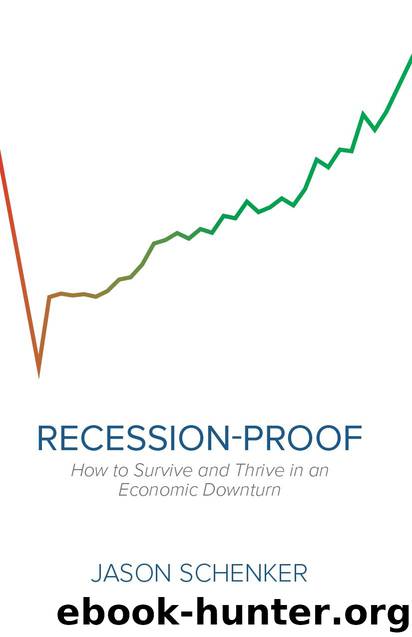Recession-Proof: How to Survive and Thrive in an Economic Downturn by Jason Schenker

Author:Jason Schenker [Schenker, Jason]
Language: eng
Format: epub, mobi
ISBN: 9781619613577
Publisher: Lioncrest Publishing
Published: 2016-02-21T22:00:00+00:00
Drill #9: Knowing What Would Work
List 5 different formal education programs you could pursue in the next 5 years that could boost your earning power and job security?
1.__________________________________
2.__________________________________
3.__________________________________
4.__________________________________
5.__________________________________
Drill #10: Knowing What You Want
List 5 different formal education programs you want to pursue in the next 5 years that could boost your earning power and job security?
1. __________________________________
2. __________________________________
3. __________________________________
4. __________________________________
5. __________________________________
Stay in school
What if you’re already in school? The trick is to graduate into a good economy, and if that means delaying graduation by a few years, by all means, do it.
Let’s say you’re 22, you’ve just graduated from a four-year program, and things are tough. The job market’s horrible, you’re stuck waiting tables and so are your friends, even that one overachiever who double-majored in computer engineering and business. You know it’s going to be a few years before anything better comes up, and by then you’ll have “employment scarring” written all over you.
Is this you? Then go to grad school. Lock yourself up in the ivory tower for a couple more years, then come out fresh as a daisy, with a sparkling new degree. When you re-enter the job market, instead of having a dusty Bachelor’s degree and two years of bagging groceries on your resume, you’ve got a Bachelor’s and a brand-spanking-new Master’s degree.
If your graduate program is fully funded, you might even make more money being a student than you would working a menial job—all the while building your skills and sidestepping employment scarring. I received full funding to get a Master’s in Applied Economics, because they needed someone who would be willing to go through and translate all the personal articles and scores of rolls of microfilm owned by a famous Austrian economist, who published some of his most important works from the 1920s to the 1940s. Whatever they want from you, if it means getting paid to get a degree, you have nothing to lose.
PhD programs are usually fully funded, and you almost always have the option of pulling the ripcord and leaving them early with just a Master’s degree. That gives you some flexibility in terms of when you enter the job market, so you can time it just right.
Actually, if you’re 22, recently graduated, and mopping floors because the economy stinks, you’ve already waited longer than you should have. The time to decide on the stay-in-school option was when you were 21 and starting your senior year of college. Most graduate programs have application deadlines in the fall or winter for the next year. If the economic omens are bad, that’s when you want to apply for that Master’s degree, and avoid even one year of menial labor and the associated employment scarring.
Download
Recession-Proof: How to Survive and Thrive in an Economic Downturn by Jason Schenker.mobi
This site does not store any files on its server. We only index and link to content provided by other sites. Please contact the content providers to delete copyright contents if any and email us, we'll remove relevant links or contents immediately.
The Compound Effect by Darren Hardy(8904)
Tools of Titans by Timothy Ferriss(8347)
Nudge - Improving Decisions about Health, Wealth, and Happiness by Thaler Sunstein(7678)
Win Bigly by Scott Adams(7172)
Deep Work by Cal Newport(7040)
Rich Dad Poor Dad by Robert T. Kiyosaki(6576)
Principles: Life and Work by Ray Dalio(6383)
Pioneering Portfolio Management by David F. Swensen(6275)
Digital Minimalism by Cal Newport;(5740)
The Barefoot Investor by Scott Pape(5729)
Grit by Angela Duckworth(5577)
The Slight Edge by Jeff Olson(5398)
Discipline Equals Freedom by Jocko Willink(5357)
The Motivation Myth by Jeff Haden(5191)
You Are a Badass at Making Money by Jen Sincero(4906)
The Four Tendencies by Gretchen Rubin(4587)
Eat That Frog! by Brian Tracy(4500)
The Confidence Code by Katty Kay(4237)
Bullshit Jobs by David Graeber(4162)
